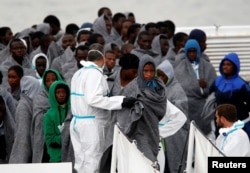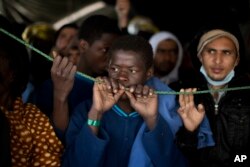A campaign to inform would-be migrants in Africa about the dangers of heading to Europe via the Mediterranean Sea aims to reach people in 15 African countries through social media, radio and television advertisements, migration officials said Wednesday.
The "Aware Migrants" campaign, which was launched last year by the Italian government and the International Organization for Migration (IOM), features video testimonies of migrants who made it to Europe but were abused, beaten or raped along the way.
The voyage from Libya across the Mediterranean to Italy — most cross the sea on flimsy boats run by smugglers — has become the main route to Europe for migrants from Africa after a European Union clampdown last year on sea crossings from Turkey.
Arrivals in Italy have risen
A record 181,000 migrants made the perilous journey last year, and arrivals in Italy this year so far have risen by two-thirds compared with the same period in 2016, IOM data show.
The campaign is now targeting potential migrants across West and Central Africa — which account for most arrivals in Italy — with posts on Facebook, Twitter, YouTube and Instagram, and advertisements with local media, said IOM spokesman Flavio Di Giacomo.
"The purpose of the campaign is not to tell migrants not to leave. That is a personal choice," he said. "But we need to provide them with as much information as possible, and quickly."
"Many migrants who arrive in Italy are not fully aware of the risks ... their journeys were more dangerous and traumatic than they expected," Di Giacomo told an online news conference.
More than 4,500 migrants drowned in the Mediterranean in 2016, and nearly 500 people crossing from Libya to Italy have died at sea this year, almost a fivefold increase from this time last year, according to the IOM.
African migrants are also prey to abuse, beatings, imprisonment and rape while heading through the Sahara desert and lawless Libya.
Stories untold
Yet many migrants who make it to Italy do not tell their friends and families about the hardships they have endured. IOM officials hope their campaign will highlight the harsh reality.
In one video on the campaign's website, Ismael, 23, talks about being imprisoned with his wife as migrants in Libya.
"They even forced my wife," he said. "They slept with my wife. She was pregnant. They used wooden sticks to beat her. She is dead."
In the latest of a slew of measures pushed by the European Union to stop migrants from reaching Europe, Italy launched a 200 million-euro ($216 million) fund last month to help African countries control their borders.







